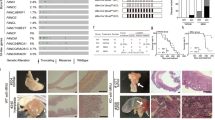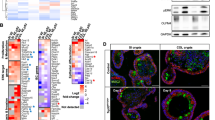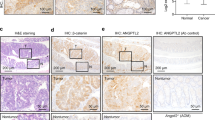Abstract
The epigenetic regulator BMI1 is upregulated progressively in a wide variety of human tumors including colorectal cancer. In this study, we assessed the requirement for Bmi1 in intestinal tumorigenesis using an autochthonous mouse model in which Apc was conditionally ablated in the intestinal epithelium. Germline mutation of Bmi1 significantly reduced both the number and size of small intestinal adenomas arising in this model, and it acted in a dose-dependent manner. Moreover, in contrast to wild-type controls, Bmi1−/− mice showed no increase in median tumor size, and a dramatic decrease in tumor number, between 3 and 4 months of age. Thus, Bmi1 is required for both progression and maintenance of small intestinal adenomas. Importantly, Bmi1 deficiency did not disrupt oncogenic events arising from Apc inactivation. Instead, the Arf tumor suppressor, a known target of Bmi1 epigenetic silencing, was upregulated in Bmi1 mutant tumors. This was accompanied by significant upregulation of p53, which was confirmed by sequencing to be wild-type, and also elevated apoptosis within the smallest Bmi1−/− adenomas. By crossing Arf into this cancer model, we showed that Arf is required for the induction of both p53 and apoptosis, and it is a key determinant of the ability of Bmi1 deficiency to suppress intestinal tumorigenesis. Finally, a conditional Bmi1 mutant strain was generated and used to determine the consequences of deleting Bmi1 specifically within the intestinal epithelium. Strikingly, intestinal-specific Bmi1 deletion suppressed small intestinal adenomas in a manner that was indistinguishable from germline Bmi1 deletion. Thus, we conclude that Bmi1 deficiency impairs the progression and maintenance of small intestinal tumors in a cell autonomous and highly Arf-dependent manner.
This is a preview of subscription content, access via your institution
Access options
Subscribe to this journal
Receive 50 print issues and online access
$259.00 per year
only $5.18 per issue
Buy this article
- Purchase on Springer Link
- Instant access to full article PDF
Prices may be subject to local taxes which are calculated during checkout




Similar content being viewed by others

References
Ferlay J, Shin HR, Bray F, Forman D, Mathers C, Parkin DM . Estimates of worldwide burden of cancer in 2008: GLOBOCAN 2008. Int J Cancer 2010; 127: 2893–2917.
Fearon ER . Molecular genetics of colorectal cancer. Ann Rev Pathol 2011; 6: 479–507.
Glinsky GV, Berezovska O, Glinskii AB . Microarray analysis identifies a death-from-cancer signature predicting therapy failure in patients with multiple types of cancer. J Clin Invest 2005; 115: 1503–1521.
Tateishi K, Ohta M, Kanai F, Guleng B, Tanaka Y, Asaoka Y et al. Dysregulated expression of stem cell factor Bmi1 in precancerous lesions of the gastrointestinal tract. Clin Cancer Res 2006; 12: 6960–6966.
Li DW, Tang HM, Fan JW, Yan DW, Zhou CZ, Li SX et al. Expression level of Bmi-1 oncoprotein is associated with progression and prognosis in colon cancer. J Cancer Res Clin Oncol 2010; 136: 997–1006.
Yu T, Chen X, Zhang W, Colon D, Shi J, Napier D et al. Regulation of the potential marker for intestinal cells, Bmi1, by beta-catenin and the zinc finger protein KLF4: implications for colon cancer. J Biol Chem 2012; 287: 3760–3768.
van der Lugt NM, Domen J, Linders K, van Roon M, Robanus-Maandag E, te Riele H et al. Posterior transformation, neurological abnormalities, and severe hematopoietic defects in mice with a targeted deletion of the bmi-1 proto-oncogene. Genes Dev 1994; 8: 757–769.
Fasano CA, Dimos JT, Ivanova NB, Lowry N, Lemischka IR, Temple S . shRNA knockdown of Bmi-1 reveals a critical role for p21-Rb pathway in NSC self-renewal during development. Cell Stem Cell 2007; 1: 87–99.
Gieni RS, Hendzel MJ . Polycomb group protein gene silencing, non-coding RNA, stem cells, and cancer. Biochem Cell Biol 2009; 87: 711–746.
Subkhankulova T, Zhang X, Leung C, Marino S . Bmi1 directly represses p21Waf1/Cip1 in Shh-induced proliferation of cerebellar granule cell progenitors. Mol Cell Neurosci 2010; 45: 151–162.
Abdouh M, Facchino S, Chatoo W, Balasingam V, Ferreira J, Bernier G . BMI1 sustains human glioblastoma multiforme stem cell renewal. J Neurosci 2009; 29: 8884–8896.
Barker N, Ridgway RA, van Es JH, van de Wetering M, Begthel H, van den Born M et al. Crypt stem cells as the cells-of-origin of intestinal cancer. Nature 2009; 457: 608–611.
Sangiorgi E, Capecchi MR . Bmi1 is expressed in vivo in intestinal stem cells. Nature Genet 2008; 40: 915–920.
van der Flier LG, van Gijn ME, Hatzis P, Kujala P, Haegebarth A, Stange DE et al. Transcription factor achaete scute-like 2 controls intestinal stem cell fate. Cell 2009; 136: 903–912.
Tian H, Biehs B, Warming S, Leong KG, Rangell L, Klein OD et al. A reserve stem cell population in small intestine renders Lgr5-positive cells dispensable. Nature 2011; 478: 255–259.
Colnot S, Niwa-Kawakita M, Hamard G, Godard C, Le Plenier S, Houbron C et al. Colorectal cancers in a new mouse model of familial adenomatous polyposis: influence of genetic and environmental modifiers. Lab Invest 2004; 84: 1619–1630.
el Marjou F, Janssen KP, Chang BH, Li M, Hindie V, Chan L et al. Tissue-specific and inducible Cre-mediated recombination in the gut epithelium. Genesis 2004; 39: 186–193.
Hinoi T, Akyol A, Theisen BK, Ferguson DO, Greenson JK, Williams BO et al. Mouse model of colonic adenoma-carcinoma progression based on somatic Apc inactivation. Cancer Res 2007; 67: 9721–9730.
Grinstein E, Wernet P . Cellular signaling in normal and cancerous stem cells. Cell Signal 2007; 19: 2428–2433.
Sherr CJ, Bertwistle D, DENB W, Kuo ML, Sugimoto M, Tago K et al. p53-Dependent and -independent functions of the Arf tumor suppressor. Cold Spring Harb Symp Quant Biol 2005; 70: 129–137.
Kamijo T, Zindy F, Roussel MF, Quelle DE, Downing JR, Ashmun RA et al. Tumor suppression at the mouse INK4a locus mediated by the alternative reading frame product p19ARF. Cell 1997; 91: 649–659.
Gibson SL, Dai CY, Lee HW, DePinho RA, Gee MS, Lee WM et al. Inhibition of colon tumor progression and angiogenesis by the Ink4a/Arf locus. Cancer Res 2003; 63: 742–746.
Soriano P . Generalized lacZ expression with the ROSA26 Cre reporter strain. Nat Genet 1999; 21: 70–71.
Dimri GP, Lee X, Basile G, Acosta M, Scott G, Roskelley C et al. A biomarker that identifies senescent human cells in culture and in aging skin in vivo. Proc Natl Acad Sci USA 1995; 92: 9363–9367.
Tallquist MD, Soriano P . Epiblast-restricted Cre expression in MORE mice: a tool to distinguish embryonic vs extra-embryonic gene function. Genesis 2000; 26: 113–115.
Acknowledgements
We dedicate this paper to the memory of Officer Sean Collier, for his caring service to the MIT community and for his sacrifice. This work was supported by an NCI/NIH grant to JAL who is a Ludwig Scholar at MIT, and fellowships to MAM (CIHR), RF (Ludwig) and KIH (NSF). We thank the Koch Institute Swanson Biotechnology Center for key technical support, particularly personnel in the ES Cell & Transgenic, Histology and Microscopy facilities. We also thank Sylvie Robine (Institut Curie) for the Vil-cre mouse and members of the Lees and Jacks labs for thoughtful comments.
Author information
Authors and Affiliations
Corresponding author
Ethics declarations
Competing interests
The authors declare no conflict of interest.
Additional information
Supplementary Information accompanies this paper on the Oncogene website
Rights and permissions
About this article
Cite this article
Maynard, M., Ferretti, R., Hilgendorf, K. et al. Bmi1 is required for tumorigenesis in a mouse model of intestinal cancer. Oncogene 33, 3742–3747 (2014). https://doi.org/10.1038/onc.2013.333
Received:
Revised:
Accepted:
Published:
Issue Date:
DOI: https://doi.org/10.1038/onc.2013.333


